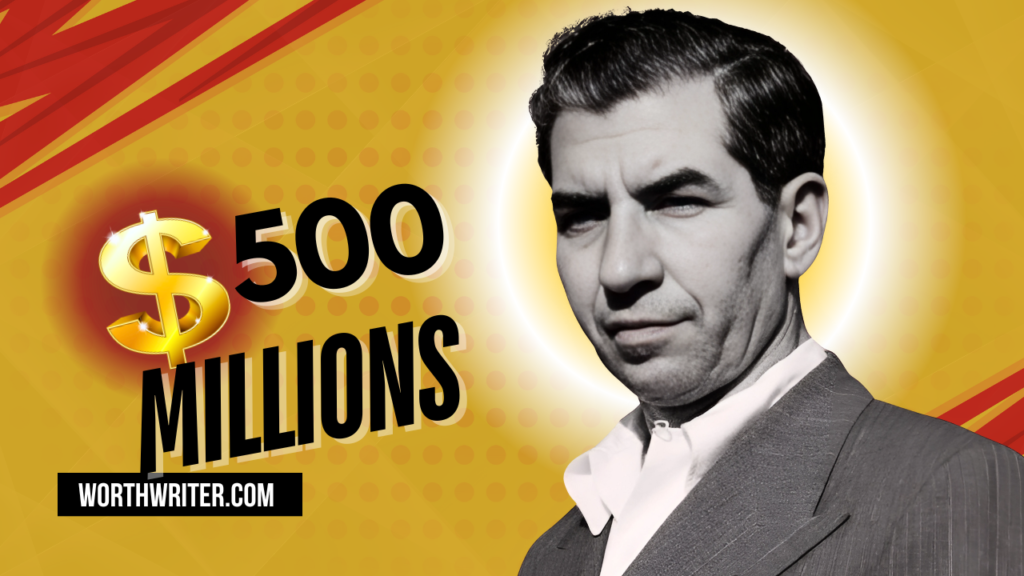Explore Charles Lucky Luciano net worth, one of the most influential mobsters in history. Learn about his criminal empire, assets, and how much he was worth at the time of his death. Also read Vito Genovese Net Worth: The Untold Wealth of a Mafia Kingpin and Carlo Gambino Net Worth 2025: $400M Crime Empire.
Introduction
Charles “Lucky” Luciano is one of the most notorious names in the world of organized crime. From his humble beginnings in Sicily to becoming the mastermind behind a vast criminal empire, Luciano’s life was a complex mix of power, wealth, and infamy. His story is not just about the millions he amassed but about how he reshaped the structure of organized crime in the United States. In this article, we will dive into the net worth of Charles “Lucky” Luciano, exploring the ways he accumulated his wealth and the lasting impact his criminal operations had on the Mafia.
Whether you’re fascinated by the dark world of organized crime or curious about the financial legacy of one of its most influential figures, you’ll find everything you need right here. Let’s uncover how Luciano became a financial powerhouse in the underworld and what his net worth might have been at the time of his death.
Takeaway Box/Table
| Topic | What You’ll Learn |
| Early Life and Criminal Beginnings | How Luciano’s childhood influenced his criminal career. |
| Rise to Power | Key events and strategies that made Luciano a major player in the Mafia. |
| Luciano’s Wealth and Assets | How Luciano accumulated his fortune and the value of his empire. |
| Legal Troubles and Exile | The legal issues that led to Luciano’s deportation and the impact on his wealth. |
| Death and Legacy | The end of Luciano’s reign and the lasting influence on organized crime. |
How Much Was Charles ‘Lucky’ Luciano Worth at the Time of His Death?
Luciano’s net worth at the time of his death was estimated to be between $300 million and $500 million in today’s dollars. His wealth came from his involvement in bootlegging, gambling, prostitution, and investments in various legal businesses like hotels and nightclubs. Luciano’s ability to maintain control of his empire while behind bars and later in exile added to his financial success, cementing his position as one of the wealthiest figures in organized crime history.
Charles ‘Lucky’ Luciano’s Early Life and Criminal Beginnings
Born Salvatore Lucania in Sicily on November 24, 1897, Luciano’s journey to becoming one of the most feared names in organized crime started in his early years. His family emigrated to New York City when he was just a child, and it wasn’t long before Luciano found himself involved in petty crime. By the time he was 10, he was already running with street gangs, a clear sign of the life he was destined to lead.
Luciano’s introduction to the world of organized crime came when he became a member of the notorious Five Points Gang, one of the most influential criminal organizations in New York. Under the guidance of established mobsters like Joe Masseria and Arnold Rothstein, Luciano quickly climbed the ranks, gaining a reputation for his cunning and ambition. His ability to make strategic alliances and ruthlessly eliminate his rivals laid the foundation for his later successes.
Key Points:
- Luciano’s early involvement in crime started with petty theft and escalated to more serious offenses.
- His partnership with other influential mobsters helped him build connections that would later be instrumental in his rise.
- Luciano’s leadership skills began to shine through even in his teenage years, setting him apart from his peers.
Rise to Power in the American Mafia
The turning point in Charles “Lucky” Luciano’s life came during Prohibition. The demand for illegal alcohol created a massive black market, and Luciano saw this as his opportunity to expand. He quickly rose to power by becoming a major player in bootlegging, working alongside other prominent gangsters, such as Meyer Lansky and Benjamin “Bugsy” Siegel. His ability to organize and streamline bootlegging operations allowed him to control much of New York’s underground liquor trade.
Luciano’s biggest contribution to the Mafia came in 1931, when he helped establish the Mafia Commission, which brought together major crime families from different ethnic backgrounds, including Italian, Jewish, and Irish gangs. This structure reduced violent infighting and created a more organized and efficient system of organized crime. His alliances with other criminal families helped him control a nationwide syndicate, transforming him into a national crime boss.
Key Points:
- Prohibition was a key moment in Luciano’s rise, as it allowed him to dominate the bootlegging trade.
- The creation of the Mafia Commission fundamentally changed the way organized crime operated in the U.S.
- Luciano’s partnerships with Jewish and Irish mobsters helped him expand his influence across the country.
Major Events in Luciano’s Rise to Power
| Year | Event |
| 1920 | Luciano becomes involved in bootlegging during Prohibition. |
| 1931 | Luciano helps form the Mafia Commission. |
| 1930s | Gains control over bootlegging, gambling, and other illegal activities. |
Luciano’s Estimated Net Worth at the Time of His Death
Charles “Lucky” Luciano’s estimated net worth at the time of his death ranged from $300 million to $500 million in today’s dollars. His wealth didn’t come from just one source—it was the result of years of bootlegging, gambling, prostitution, and other illicit ventures. Additionally, Luciano was known for making strategic investments in legal businesses, including hotels and nightclubs, which helped him launder money and build his fortune.
Luciano’s ability to remain a financial powerhouse was bolstered by his control over an intricate web of criminal enterprises, which allowed him to keep profits flowing even when he faced legal issues. His wealth wasn’t just about cash—it was about assets that spanned both the legal and illegal worlds.
Key Points:
- Luciano’s wealth came from a mix of illegal activities like bootlegging and legal investments in businesses.
- He was known for having diversified his wealth into both criminal and legitimate enterprises.
- Luciano’s control over a national crime syndicate allowed him to amass significant wealth.
Luciano’s Wealth vs Other Mobsters
| Mobster | Estimated Net Worth (Adjusted for Inflation) |
| Charles “Lucky” Luciano | $300 million – $500 million |
| Al Capone | $1.3 billion |
| Meyer Lansky | $600 million |
Legal Troubles, Exile, and the Impact on His Wealth
Luciano’s criminal career wasn’t without its share of legal problems. In 1936, he was convicted for compulsory prostitution, which led to a lengthy prison sentence. Despite being behind bars, Luciano continued to run his criminal empire, exerting influence over his underworld network through trusted lieutenants. This period marked the beginning of his exile from the United States.
After serving his sentence, Luciano was deported to Italy as part of a deal with U.S. authorities during World War II. This exile didn’t end his influence, as he still managed to maintain control over parts of the Mafia, though his direct wealth was severely affected by the loss of his U.S. assets. The deportation marked a significant shift in his criminal career, but he remained wealthy, mostly through his connections and investments that spanned multiple continents.
Key Points:
- Luciano’s conviction and imprisonment didn’t prevent him from maintaining control over his criminal operations.
- The deportation to Italy impacted his U.S.-based wealth but did not completely diminish his assets.
- Luciano’s exile was a blow to his power, but his legacy and wealth continued through his criminal network.
Death and Legacy of Charles ‘Lucky’ Luciano
Luciano passed away on January 26, 1962, from a heart attack at Naples Airport. His death marked the end of an era for the American Mafia, but his influence lived on. Despite his legal troubles and exile, Luciano laid the foundation for the Mafia’s continued success, and his legacy lived on through the crime families that followed.
Luciano’s story has been immortalized in books, films, and documentaries. His life has become a cultural symbol of the classic Mafia figure—a ruthless yet brilliant businessman who controlled vast criminal operations while maintaining an air of mystery and intrigue.
Key Points:
- Luciano’s death marked the end of an era in the Mafia, but his influence endured through subsequent generations.
- His legacy as a mobster and business strategist continues to influence modern-day depictions of organized crime.
- Luciano’s cultural impact remains strong, with portrayals of him in media keeping his memory alive.
Conclusion
Charles “Lucky” Luciano’s wealth and legacy continue to shape the image of organized crime in America. From his humble beginnings to becoming one of the most powerful figures in the Mafia, Luciano’s story is a testament to his genius and ruthlessness.
Despite facing legal battles and eventual exile, he remained a financial powerhouse, with his wealth estimated at between $300 million and $500 million in today’s dollars.
His contributions to organized crime—especially the creation of the Mafia Commission—have left a lasting mark, cementing his place in both criminal history and pop culture.
FAQs – Charles Lucky Luciano Net Worth
How did Charles ‘Lucky’ Luciano make his money?
Luciano made his fortune through bootlegging, gambling, prostitution, and investments in legitimate businesses such as nightclubs and hotels. His criminal empire spanned across multiple illegal activities, making him one of the wealthiest mobsters in history.
What was the real value of Luciano’s net worth?
Luciano’s net worth at the time of his death is estimated to have been between $300 million and $500 million in today’s dollars. His wealth was accumulated through various criminal enterprises, and he invested heavily in legal businesses to launder his money.
Did Charles ‘Lucky’ Luciano ever return to the U.S. after his deportation?
No, Luciano was deported to Italy after World War II, and he never returned to the U.S. Despite his exile, he continued to exert influence over his criminal network from abroad.
What is the legacy of Charles ‘Lucky’ Luciano?
Luciano’s legacy lives on in the organized crime world. His establishment of the Mafia Commission reshaped the Mafia’s operations, and his influence continues to be seen in media and modern-day Mafia families.



